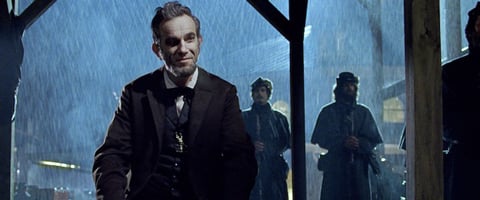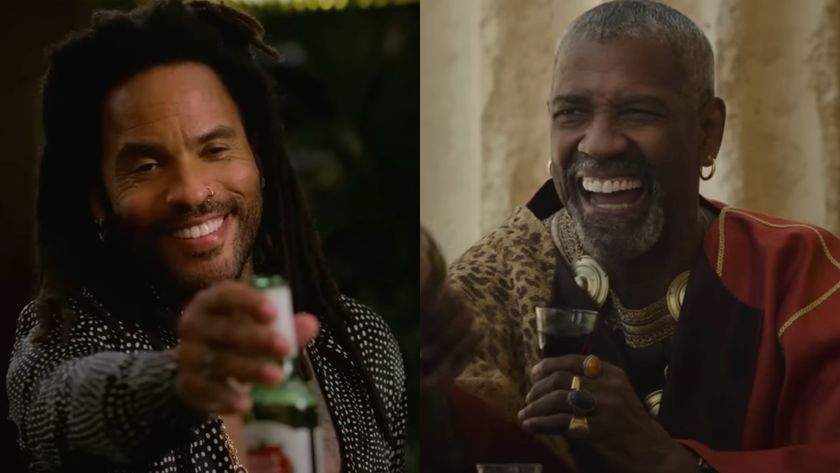Review: Steven Spielberg's Lincoln Premieres At NYFF, And Tommy Lee Jones Runs Away With It

A sold-out crowd packed the Alice Tully Hall at the aptly named Lincoln Center tonight for the New York Film Festival Secret Screening that pretty much everyone knew at that point was Steven Spielberg's Lincoln, billed as unfinished but looking very much complete. I was seated in a side balcony, not only a terrible angle for viewing a movie, but a pretty ominous one for a biopic about a guy who was assassinated in a theater; I was ready to consider myself lucky if I made it out the theater alive (and with my checked cell phone returned to me), though of course, I had some muted high hopes for the actual movie itself.
There were moments of Lincoln where I was ready to throw something at the screen in exasperation, either where John Williams's score got all War Horse sentimental or Tony Kushner's script got weirdly didactic in explaining the nuts-and-bolts politics at the center of the film's action. It will be especially surprising if you've seen Lincoln's big, sweeping trailers to learn that it is a very wonky movie, almost entirely about Lincoln's efforts to pass the 13th Amendment to abolish slavery, which he and his Cabinet accomplished both by being morally right and pulling off some classic Washington back room deals. The first hour of the film contains some long lessons about how a bill becomes a law (passed by the Senate and then a 2/3 majority in the House!) and some interminable exposition about the state of the Civil War, and the well-lit, sumptuously detailed Lincoln seems perilously close to becoming the dutiful civics lesson appropriate only for viewing in drowsy high school classrooms.
But Lincoln has more than a few aces up its sleeve, with a dynamite and incredibly wide-ranging supporting cast and a payoff for all that Constitutional exposition with a genuinely tense scene that involves a House roll-call (yes, just like on C-SPAN, but with more shouting and a lot more facial hair). Tommy Lee Jones steals the film right out from under the very good Daniel Day-Lewis, playing the strongly anti-slavery Pennsylvania representative Thaddeus Stevens, who gets into some real knock-down drag-out fights with the pro-slavery faction on the House floor, and always has the best zingers. And you may spend a large section of the film trying to squint through all the facial hair to recognize some favorite actors, from John Hawkes, Tim Blake Nelson and James Spader as a trio of ne'er-do-wells manipulating votes behind the scenes to Mad Men's Jared Harris as a believably grizzled Ulysses S. Grant. And those are just the sizable parts-- David Oyelowo, Dane DeHaan, Lukas Haas, Walton Goggins, Adam Driver, Julie White, Hal Holbrook, Michael Stuhlbarg and many more all pop up in a handful of scenes, giving Argo a serious run for its money as the 2012 film most crammed full of character actors you love.
The problem is that, with so much fun action happening on the House floor, the ostensible main characters get overshadowed-- and none more so than Lincoln, a soft-spoken and obviously powerful figure who still isn't part of some of the film's best scenes. Day-Lewis's performance is faultless and surprisingly restrained, but he spends far too much of the film acting opposite Sally Field as Mary Todd Lincoln (giving a performance badly out of step with the film's low-key tone) or Joseph Gordon-Levitt as eldest son Robert, a character with almost no bearing on the plot. Spielberg's emphasis on Robert and youngest son Tad (Gulliver McGrath) feels almost like a parody of his love for father-and-son stories, but Spielberg never brings his personal touch to these parts of the film; it's way more fun and emotionally meaningful to simply watch Lincoln in the dirty work of making the government work.
The best moments of Lincoln are satisfying and often very funny, but there are no emotional heights or applause moments, and very little of the twinkly Spielberg sentimentality that drowned out War Horse. Lincoln probably could have used a little more of that, actually, but it's very much in-step with its rock-steady protagonist, a man full of funny stories and aphorisms but rarely feeling more human than the marble statue we're all familiar with. For all its period polish Lincoln is almost certainly a Best Picture nominee, but that restraint will probably keep it from winning-- and will probably prevent Day-Lewis from winning too, as much as I expect his toned-down performance will grow in my estimation the further I get away from it.
The movie's best shot at an Oscar is probably Tommy Lee Jones, believe it or not. Even halfway through the film I couldn't imagine how a single actor could break through the pack, but Jones has all of the film's best scenes and biggest laughs, and his epic fights with Lee Pace on the House floor (yes, poor Lee Pace goes toe-to-toe with Tommy Lee Jones) are the closest the film gets to thrilling. Cinematographer Janusz Kaminski, John Williams and the makeup artists will all surely be nominated, but especially given the weak Best Supporting Actor field, Jones has a very good shot at his second win-- and for making a movie as glossy as Lincoln so funny at times, he probably deserves it.
I'll be writing more about Lincoln's Oscar chances in tomorrow's Oscar Eye column, and more about the film itself as the season rolls along. As much as I felt truly exhausted by the film at times, I already find myself wanting to see it again for the supporting cast alone-- not exactly the mark of a great movie, but one with strengths that go far beyond its title character.
CINEMABLEND NEWSLETTER
Your Daily Blend of Entertainment News
Staff Writer at CinemaBlend
Most Popular










